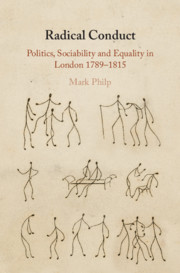Book contents
- Radical Conduct
- Radical Conduct
- Copyright page
- Dedication
- Contents
- Figures and Tables
- Acknowledgements
- Introduction
- 1 Politics and Privacy
- 2 Disagreement and Deliberation
- 3 Plurality
- 4 Radical Literary Women
- 5 Gender and Deliberative Equality
- 6 Negotiating Equality
- 7 A Private Affair
- 8 Music and Movement
- Conclusion
- Bibliography
- Index
1 - Politics and Privacy
Published online by Cambridge University Press: 20 August 2020
- Radical Conduct
- Radical Conduct
- Copyright page
- Dedication
- Contents
- Figures and Tables
- Acknowledgements
- Introduction
- 1 Politics and Privacy
- 2 Disagreement and Deliberation
- 3 Plurality
- 4 Radical Literary Women
- 5 Gender and Deliberative Equality
- 6 Negotiating Equality
- 7 A Private Affair
- 8 Music and Movement
- Conclusion
- Bibliography
- Index
Summary
While the 1790s are often thought of as the most political of years, this chapter uses a range of sources to question that assumption and to point to the extent that much talk about politics was seen as an essentially private matter.That position was one that loyalism and the government increasingly challenged in the 1790s, breaking down long-standing ways of understanding private conversation and political discussion and opening the way for the emergence of a new language and politics for both loyalism and reform at the beginning of the nineteenth century.Using newspaper archives it identifies the emergence of a new lexicon of politics, linked especially to the period 1820-1840, alongside the development of a new set of political practices.In the 1790s those interested in reform faced new and disturbing challenges to their practices and expectations and had to develop ways of responding to a world in which their alternatives seemed to become dramatically starker.
- Type
- Chapter
- Information
- Radical ConductPolitics, Sociability and Equality in London 1789-1815, pp. 23 - 56Publisher: Cambridge University PressPrint publication year: 2020

